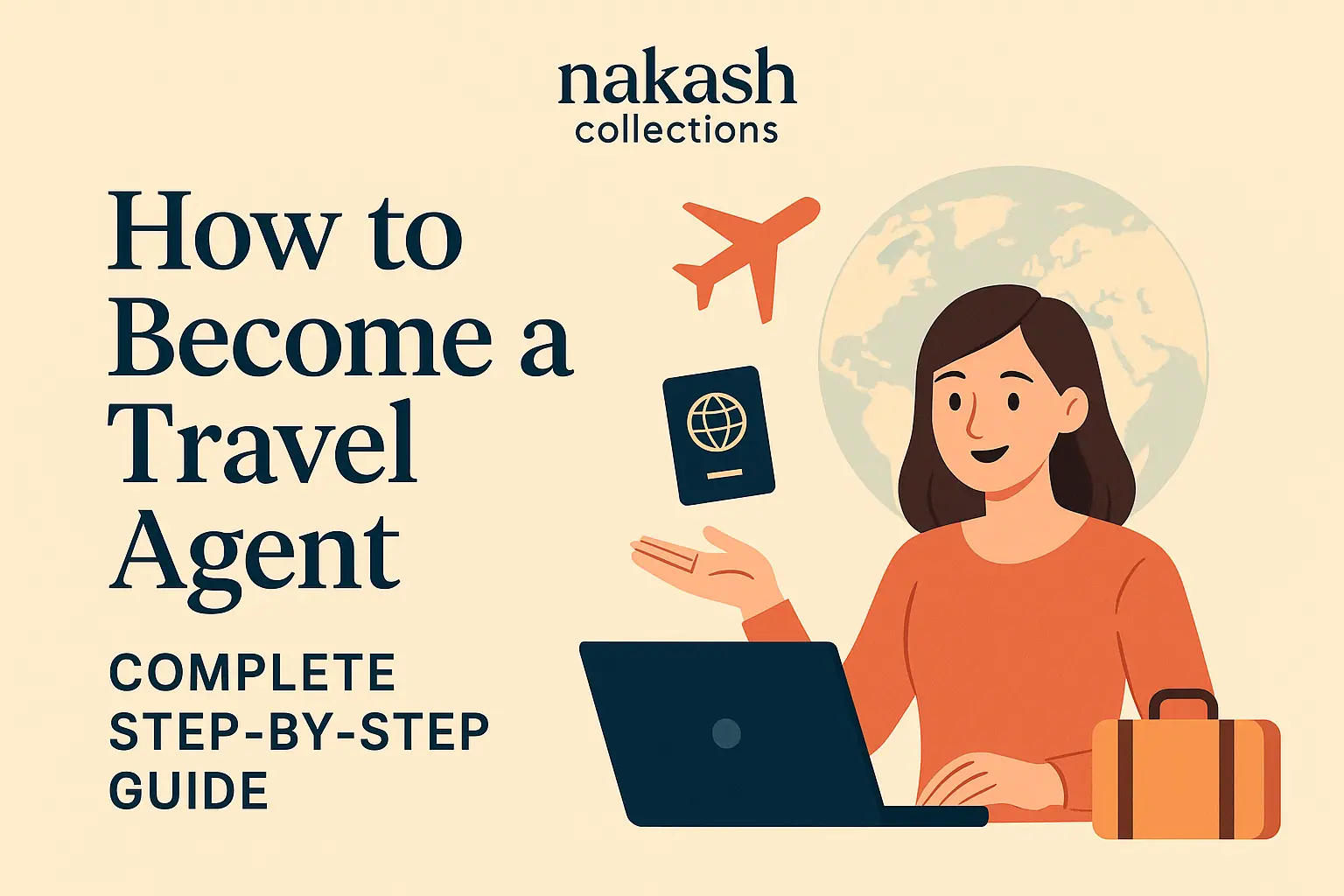The travel industry continues to be one of the most dynamic and rewarding fields, offering flexibility, creativity, and the opportunity to turn your passion for exploration into a full-time career. Whether you dream of working from home as an independent travel consultant or joining a large agency, learning how to become a travel agent is your first step toward building a profitable and fulfilling business.
According to the U.S. Bureau of Labor Statistics, the travel agent industry is projected to grow by 3% between 2022 and 2032, with more than 7,000 job openings expected each year. This growth is fueled by the rising demand for personalized travel experiences and expert guidance in navigating an increasingly complex travel landscape.
Step 1: Understand the Role of a Travel Agent
Before you start learning how to become a travel agent, it’s crucial to understand what travel agents actually do. A travel agent’s primary role is to plan, organize, and book travel arrangements for clients, including flights, hotels, cruises, tours, and travel insurance.
They act as intermediaries between travelers and service providers, ensuring smooth and stress-free trips. A successful travel agent combines sales, customer service, and destination expertise to provide clients with valuable advice and cost-effective travel options.
Key Responsibilities:
- Researching and booking flights, accommodation, and activities
- Advising clients on destinations, weather, and travel restrictions
- Managing group bookings and corporate trips
- Handling last-minute changes or cancellations
According to Travel Weekly’s 2024 industry report, over 55% of travelers now prefer booking through human agents rather than online portals for complex itineraries.
Step 2: Choose Your Niche or Specialty

The next stage in how to become a travel agent is finding your niche. Specialization helps you stand out in a competitive market and attract a loyal customer base. Some popular travel niches include:
- Luxury or boutique travel
- Destination weddings and honeymoons
- Corporate or business travel
- Adventure and eco-tourism
- Cruise planning
- Family and group vacations
By focusing on a niche, you can become an expert in a particular area and tailor your marketing efforts more effectively. For example, a 2023 Statista report found that luxury travel bookings grew by 14% year-over-year, with millennials representing a large share of the clientele.
Step 3: Get Proper Education and Training
While a college degree isn’t mandatory, completing specialized courses can make a huge difference in your credibility and skills. Many people researching how to become a travel agent start by taking travel and tourism programs, which are often available online or through vocational schools.
Recommended Certifications and Courses:
- The Travel Institute’s CTA (Certified Travel Associate)
- ASTA (American Society of Travel Advisors) courses
- IATA (International Air Transport Association) certifications
- CLIA (Cruise Lines International Association) training for cruise specialists
These programs teach valuable skills like ticketing systems (GDS such as Amadeus or Sabre), customer management, and global travel regulations. In addition, certified agents often earn 10–20% higher commissions than non-certified peers, according to Host Agency Reviews.
Step 4: Decide Between Working for an Agency or Going Independent
When learning how to become a travel agent, you’ll need to decide whether to join an established agency or start your own business.
Option 1: Work with a Host Agency
Joining a host agency allows new agents to access supplier connections, licensing, and marketing tools without managing operations themselves. You’ll earn commissions for every booking, typically ranging from 60% to 90% of total profit depending on performance.
Option 2: Start Your Own Travel Business
Becoming an independent agent offers greater freedom and earning potential, but it also means handling your own marketing, legal compliance, and client acquisition. Many independent agents work remotely and use social media or referral networks to grow their client base.
Step 5: Obtain the Necessary Licenses and Business Requirements
Depending on where you live, you may need specific licenses or registrations before offering paid travel services. In the U.S., states like California, Florida, Hawaii, and Washington require travel agents to register as sellers of travel.
You’ll also need:
- A business license and registered name
- A business bank account
- Professional liability insurance
- A host agency agreement (if applicable)
For those working remotely, compliance with IATA or CLIA membership can also enhance credibility and give access to exclusive travel deals and supplier commissions.
Step 6: Build Your Business and Find Clients
Now that you know how to become a travel agent, the next step is to attract clients. Building a personal brand is key. Use social media platforms like Instagram, Pinterest, or LinkedIn to showcase travel inspiration, testimonials, and exclusive deals.
Marketing Tips for New Travel Agents:
- Create a professional website with your niche focus
- Offer free travel consultations or destination guides
- Collect client reviews and share success stories
- Join travel networking events and online communities
According to HubSpot’s 2024 marketing statistics, 92% of consumers trust referrals from people they know, making word-of-mouth and client reviews your strongest assets.
Step 7: Master the Tools of the Trade
Modern travel agents rely on software and digital tools to streamline operations. Familiarize yourself with Global Distribution Systems (GDS), CRM software, and online booking platforms.
Top Tools to Consider:
- Amadeus or Sabre (flight booking)
- Travelport or Tramada (itinerary management)
- Mailchimp or HubSpot CRM (marketing and client follow-up)
- Canva or Adobe Express (social media content creation)
Digital efficiency can boost productivity by up to 30%, according to a 2023 survey by TravelPulse, helping agents serve more clients in less time.
Step 8: Develop Your Expertise Through Continuous Learning
The travel industry evolves constantly, new destinations, travel restrictions, and technologies appear every year. To stay relevant, successful agents continually expand their knowledge through webinars, trade shows, and online training.
Join Professional Associations:
- American Society of Travel Advisors (ASTA)
- International Air Transport Association (IATA)
- Cruise Lines International Association (CLIA)
Becoming a member of such organizations adds credibility and helps you stay updated with global travel trends, which is vital in mastering how to become a travel agent effectively.
Step 9: Understand Earnings and Growth Potential
One of the most common questions people ask when researching how to become a travel agent is about salary. The income varies based on niche, experience, and business model.
Typical Income Ranges (U.S., 2024):
- Entry-level agents: $35,000 – $45,000 annually
- Experienced agents or specialists: $60,000 – $100,000+
- Independent agents with established clientele: $150,000+ potential
Most agents earn through commissions and service fees, often supplemented by bonuses from travel suppliers or group tour operators.
According to Host Agency Reviews, the average annual income for hosted agents in 2024 was $51,000, while self-employed agents earned up to $80,000 or more depending on their sales volume.
Step 10: Offer Exceptional Customer Service
At the heart of a travel agent’s success lies customer satisfaction. Providing personalized attention, responding promptly, and resolving issues quickly build long-term loyalty.
A 2024 Travelport study revealed that 81% of travelers prioritize agents who provide personalized recommendations and proactive support. To thrive, always go the extra mile, send follow-up messages after trips, offer loyalty discounts, and remember key client preferences.
Click nakash.signaturehome.online to read more travel blogs.
Final Thoughts!
Learning how to become a travel agent is more than just a career change, it’s an opportunity to blend your passion for travel with professional growth. With proper training, business planning, and commitment to exceptional service, you can build a successful, flexible, and financially rewarding career helping others explore the world.
As travel continues to rebound and global tourism surpasses pre-pandemic levels, there’s never been a better time to start your journey in the travel industry.
FAQs About How to Become a Travel Agent
- Do I need a degree to become a travel agent?
No, a formal degree isn’t required. However, completing certifications like CTA or IATA can improve your credibility and career growth. - Can I become a travel agent from home?
Absolutely. Many professionals work as remote travel agents using online booking tools and digital marketing to reach clients worldwide. - How long does it take to become a travel agent?
You can complete training and start working within 3–6 months, depending on your chosen program and experience level. - How much money do travel agents make?
Income varies widely, from $35,000 for beginners to over $100,000 for experienced or niche specialists. - What are the best travel agent certifications?
CTA, CLIA, and IATA certifications are among the most recognized and respected in the global travel industry.



